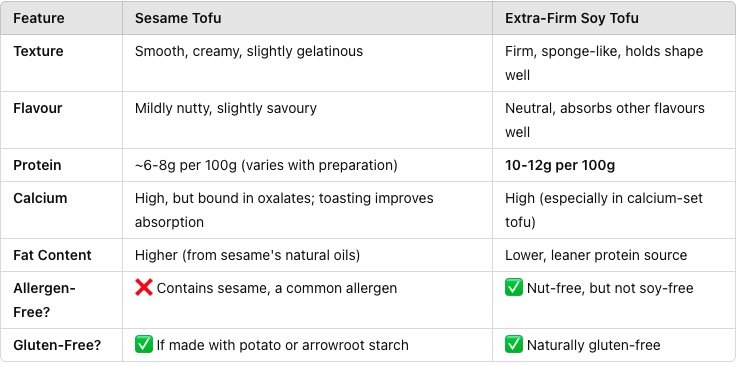Sesame Tofu – A Creamy, Nutty, High-Calcium Alternative
What Is Sesame Tofu?
Sesame tofu is a smooth, creamy plant-based tofu alternative made from ground sesame seeds and starch instead of soybeans. Unlike soy tofu, it has a mildly nutty flavour and a naturally silky texture, making it perfect for both savoury and sweet dishes.
Originating from Japan, where it is known as goma-dofu (胡麻豆腐), sesame tofu is traditionally served chilled with a light soy-based sauce or used in Buddhist temple cuisine.
How It Compares to Soy Tofu
Key Differences:
Sesame tofu is creamier and smoother, while soy tofu is firmer and more structured.
Higher in healthy fats but lower in protein than extra-firm soy tofu.
Richer in calcium, but some of it is bound in oxalates—toasting the sesame seeds helps increase absorption.
Naturally gluten-free, but only if gluten-free starches are used (e.g., potato starch instead of wheat starch).
Nutritional Information (Per 100g Serving)
Calories: ~100-140 kcal
Protein: ~6-8g
Fat: ~8-12g (healthy unsaturated fats)
Carbohydrates: ~2-5g (varies with starch used)
Calcium: High (~300-400mg, but bioavailability varies)
Iron: ~2-3mg
Health Benefits:
✔ Great source of plant-based calcium – Toasting sesame before making tofu may improve absorption.
✔ Rich in healthy fats – Supports brain and heart health.
✔ Low-carb option – Lower in carbohydrates than soy tofu, making it ideal for low-carb diets.
✔ Anti-inflammatory properties – Sesame contains compounds like sesamin and sesamol, which may help reduce inflammation.
Environmental Impact
🌱 Sesame is a sustainable crop:
Requires less water than soybeans.
Naturally pest-resistant, reducing the need for pesticides.
Grows well in arid conditions, making it a drought-tolerant crop.
How It Compares to Soy Tofu:
Sesame farming generally has a lower impact than large-scale soy monoculture.
Soybeans require more land and water but produce higher protein yields per acre.
Both sesame and soy are more sustainable than dairy or meat-based proteins.
How to Make Sesame Tofu at Home 🏡
Ingredients:
✔ 1 cup toasted white sesame seeds
✔ 2 ½ cups water
✔ ¼ cup potato starch (or arrowroot starch for a gluten-free option)
✔ ½ tsp salt
Instructions:
🔹 1. Blend the Sesame Milk
Toast the sesame seeds lightly in a dry pan until fragrant (this enhances flavour and calcium absorption).
Blend with 2 ½ cups water until smooth.
🔹 2. Strain for a Smooth Texture
Pour through a fine sieve or nut milk bag to remove solids.
🔹 3. Heat & Thicken
Mix the strained sesame milk with potato starch and salt in a pot.
Stir continuously over medium heat until the mixture thickens into a pudding-like consistency.
🔹 4. Set the Tofu
Transfer to a mould and smooth the surface.
Refrigerate for 4-6 hours, or until firm.
🔹 5. Slice & Serve
Enjoy chilled, drizzled with soy sauce or sesame dressing!
5 Delicious Dishes Using Sesame Tofu 🍽
1️⃣ Classic Japanese Goma-Dofu – Served chilled with soy sauce, wasabi, and dashi-based sauce.
2️⃣ Sesame Tofu Stir-Fry – Lightly pan-fried and tossed with veggies.
3️⃣ Sesame Tofu Noodle Bowl – Topped with peanut or tahini dressing.
4️⃣ Sesame Tofu Miso Soup – A creamy twist on traditional miso soup.
5️⃣ Sweet Sesame Pudding – Blended with maple syrup for a dessert option.
💡 Storage Tips
✅ Fridge: Store in an airtight container submerged in cold water for up to 4 days.
✅ Freezing? ❌ Not recommended – sesame tofu loses its smooth texture when frozen.
✅ Signs of Spoilage: Discolouration, sour smell, or slimy texture = time to discard!
💡 Troubleshooting Section
❓ Why is my sesame tofu too soft?
🔹 Increase the starch ratio for a firmer consistency.
❓ Why won’t my tofu set properly?
🔹 Ensure the mixture thickens completely before refrigerating—look for a pudding-like texture.
❓ Why does my tofu taste bitter?
🔹 Use fresh, high-quality sesame seeds—rancid sesame has a strong bitter taste.
❓ Why is my tofu grainy?
🔹 Blend the sesame milk thoroughly and strain well before cooking.
Final Takeaway: Why You Should Try Sesame Tofu
✔ Nutty, smooth, and uniquely delicious – A creamy alternative to soy tofu.
✔ Rich in healthy fats and plant-based calcium – A great dairy-free source of key nutrients.
✔ Easy to make at home – Requires just four simple ingredients.
✔ Versatile in both sweet and savoury dishes – From Japanese goma-dofu to miso soup!
✔ Sustainable and allergy-friendly (for some!) – A great nut-free tofu alternative, but not suitable for those with sesame allergies.
Would you try sesame tofu? Let us know in the comments! 👇


